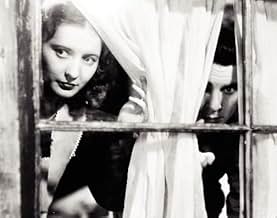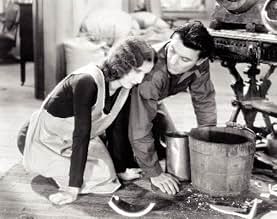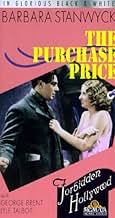VALUTAZIONE IMDb
6,4/10
2039
LA TUA VALUTAZIONE
Aggiungi una trama nella tua linguaA torch singer becomes a farmer's mail-order bride.A torch singer becomes a farmer's mail-order bride.A torch singer becomes a farmer's mail-order bride.
- Regia
- Sceneggiatura
- Star
Mae Busch
- Queenie - Girl on Train
- (non citato nei titoli originali)
Nick Copeland
- Skins' Pal at Shivaree
- (non citato nei titoli originali)
Mike Donlin
- Tom Buchanan - Man at Shivaree
- (non citato nei titoli originali)
Harrison Greene
- Man in Hotel Lobby
- (non citato nei titoli originali)
Crauford Kent
- A.C. Peters - The Banker
- (non citato nei titoli originali)
Matt McHugh
- Waco - Fields' Henchman
- (non citato nei titoli originali)
John 'Skins' Miller
- Skins - The Accordion Player
- (non citato nei titoli originali)
Carlyle Moore Jr.
- Hotel Desk Clerk
- (non citato nei titoli originali)
Edmund Mortimer
- Dance Extra
- (non citato nei titoli originali)
William H. O'Brien
- Waiter in Opening Nightclub Scene
- (non citato nei titoli originali)
Henry Otho
- Extra in Beer Hall and at Shivaree
- (non citato nei titoli originali)
Recensioni in evidenza
This peculiar but interesting drama has Barbara Stanwyck as a weary nightclub torch singer with a "who cares?" attitude. To escape her underworld boyfriend, she decides to hide out in the bleak plains of North Dakota as a mail-order bride. As her shy farmer husband, the normally debonair George Brent is almost unrecognizable in a pair of overalls, but gives a sensitive characterization. The bulk of the plot follows the growing feeling between the reserved country mouse' and the tough city mouse', complicated by several villains. Tough guy director William Wellman keeps things moving at a clip, and uses his low budget wisely to stage several good set-pieces, including a drunken shivaree for the happy couple. In the supporting cast, Leila Bennett stands out as a plain-talking maid.
This is sold as "pre-Code," as if there will something risqué or shocking, but certainly by today's standards -- or lack thereof -- and even by those of the era, there is nothing to bother your grandma or even your (reasonable) preacher.
There is something, though, to excite the movie-lover: Barbara Stanwyck's performance.
Apparently in real life she was a pretty tough cookie, and certainly she played some hard women in many of her films.
In "The Purchase Price" her character refers to herself as having maintained some sort of a reputation and in fact she comes across as a very nice, even admirable person.
She certainly looked good, with a gentle strength, or strong gentleness, poking out of the chorus girl/mistress persona.
The story, though, never does make much sense, and why the people did what they did, except for the character played by Lyle Talbot -- in a great role for him, and excellently played -- is not clear.
One more glaring error: North (brrrr) Dakota doesn't have any hills, and the shots of snow-capped peaks showed that wherever this film was shot, it sure wasn't North (brrrr) Dakota, you betcha.
One scene of plowing showed the genuine agoraphobic look of that state, where neither hills nor even trees are native. Except for cottonwoods along the creeks and rivers, what trees there are in North (brrrr) Dakota have had to be brought in from the real world.
Plus North (brrrrr) Dakota drunks and brawlers are not Irish and Scots, as this movie implies, but Poles and Czechs and Germans, sometimes even Norwegians, unless they are Lutherans then, of course, they don't drink or brawl. And if you don't believe me, ask their preachers.
Anyway, watch this for Stanwyck and suspend your disbelief about all the rest. She is worth spending your time.
There is something, though, to excite the movie-lover: Barbara Stanwyck's performance.
Apparently in real life she was a pretty tough cookie, and certainly she played some hard women in many of her films.
In "The Purchase Price" her character refers to herself as having maintained some sort of a reputation and in fact she comes across as a very nice, even admirable person.
She certainly looked good, with a gentle strength, or strong gentleness, poking out of the chorus girl/mistress persona.
The story, though, never does make much sense, and why the people did what they did, except for the character played by Lyle Talbot -- in a great role for him, and excellently played -- is not clear.
One more glaring error: North (brrrr) Dakota doesn't have any hills, and the shots of snow-capped peaks showed that wherever this film was shot, it sure wasn't North (brrrr) Dakota, you betcha.
One scene of plowing showed the genuine agoraphobic look of that state, where neither hills nor even trees are native. Except for cottonwoods along the creeks and rivers, what trees there are in North (brrrr) Dakota have had to be brought in from the real world.
Plus North (brrrrr) Dakota drunks and brawlers are not Irish and Scots, as this movie implies, but Poles and Czechs and Germans, sometimes even Norwegians, unless they are Lutherans then, of course, they don't drink or brawl. And if you don't believe me, ask their preachers.
Anyway, watch this for Stanwyck and suspend your disbelief about all the rest. She is worth spending your time.
She may be dressed down for the farm wife's part, but this is Stanwyck at her youthful loveliest. So, can Joan (Stanwyck) adjust to the rigors of rural life after the glamor of big city nightclubs. If you can buy her becoming a mail-order bride as an alternative, you might buy the rest. Seeing her city girl alone on the vast Canadian prairie, suitcase in hand, waiting for her intended, does present a stretch. Nonetheless, now she's got purpose in life, no longer just a meaningless rich man's ornament. I do wish Brent as her mail-order hubby showed a little charm, something that would help us believe she would stick with her new life. Instead, he's overly dour and insensitive, wanting to manhandle her on their wedding night. Getting the two in step with each other makes up the movie's main part.
The movie's quite good at showing the rigors of farm life—the primitive farm house, the constant grubby toil, the relative isolation. I expect Dust Bowl audiences could identify with these demanding aspects, especially when the bank threatens to repossess Jim's (Brent) farm. That Joan manages to stick it out and thrive suggests that behind city decadence lies a common humanity and hidden grit-- a good message for that time and maybe any.
Anyway, pre-Code doesn't disappoint as Stanwyck gets to show off fancy and not-so-fancy underwear. Then too, sleeping arrangements leave little in doubt. Note too, how little is done to prettify either the rough-hewn people or their lives, even though most are stereotypes. Also, I could have done without the barking idiot as comedy relief. All in all, this Warner Bros. antique (1933) remains a fairly interesting little programmer, with a humane underlying message.
The movie's quite good at showing the rigors of farm life—the primitive farm house, the constant grubby toil, the relative isolation. I expect Dust Bowl audiences could identify with these demanding aspects, especially when the bank threatens to repossess Jim's (Brent) farm. That Joan manages to stick it out and thrive suggests that behind city decadence lies a common humanity and hidden grit-- a good message for that time and maybe any.
Anyway, pre-Code doesn't disappoint as Stanwyck gets to show off fancy and not-so-fancy underwear. Then too, sleeping arrangements leave little in doubt. Note too, how little is done to prettify either the rough-hewn people or their lives, even though most are stereotypes. Also, I could have done without the barking idiot as comedy relief. All in all, this Warner Bros. antique (1933) remains a fairly interesting little programmer, with a humane underlying message.
Of course this delicious tour-de-force is totally incredible... but WOW! You can't take your eyes off the screen in case Wellman gives his heroine whiplash as she moves from plushly-kept woman in Manhattan to mail-order farmer's bride in North Dakota. From take-out at Tiffany's to hauling coal nuggets 20 miles through a blizzard. From igniting the lust in men with her daring chanteusing to putting out the fire villains set to her and hubby George Brent's last-hope crop of wheat. All in just over 60 minutes!
The appeal of this somewhat run-of-the-mill film is Barbara Stanwyck in an early display of her mega-watt star power and her ability to turn mediocre material into something special.
Her character doesn't make much sense: a nightclub singer from the city who wants to get away from the bootlegger boyfriend hounding her and so agrees to an arranged marriage with a farmer up in the wilds of North Dakota! The bootlegger (played by Lyle Talbot) isn't threatening or abusive, so one wonders why Stanwyck needs to go to such great lengths to avoid him -- keep wondering, because the movie never explains it. But if you can swallow that, then you can easily swallow the fact that this urban good-time gal seems to know all about how to run a farm.
Which brings me back to Stanwyck. The movie's premise isn't remotely plausible, but Stanwyck somehow makes it so through the confidence of her performance. I really think she could make anything worth sitting through just for the pleasure of watching her.
The film does provide an interesting look at what farm life in the early days of the 1930s was like, a lifestyle I've only seen recreated in more modern-day movies.
Grade: B-
Her character doesn't make much sense: a nightclub singer from the city who wants to get away from the bootlegger boyfriend hounding her and so agrees to an arranged marriage with a farmer up in the wilds of North Dakota! The bootlegger (played by Lyle Talbot) isn't threatening or abusive, so one wonders why Stanwyck needs to go to such great lengths to avoid him -- keep wondering, because the movie never explains it. But if you can swallow that, then you can easily swallow the fact that this urban good-time gal seems to know all about how to run a farm.
Which brings me back to Stanwyck. The movie's premise isn't remotely plausible, but Stanwyck somehow makes it so through the confidence of her performance. I really think she could make anything worth sitting through just for the pleasure of watching her.
The film does provide an interesting look at what farm life in the early days of the 1930s was like, a lifestyle I've only seen recreated in more modern-day movies.
Grade: B-
Lo sapevi?
- QuizDuring the wheat-burning scene a stand-in was used instead of Barbara Stanwyck, but she didn't think the stand-in acted as the character so Stanwyck decided to play it herself. This resulted in her getting some burns on her legs, but she never complained.
- BlooperWhen Barbara Stanwyck gets off the train in North Dakota the terrain is very mountainous. North Dakota is on the Great Plains - very flat.
- Citazioni
Eddie 'Ed' Fields: Ya daffy little tahmata, I'm bugs about ya. I'd marry ya myself, if I wasn't already married.
- ConnessioniFeatured in Barbara Stanwyck: Fire and Desire (1991)
- Colonne sonoreTake Me Away
(1932) (uncredited)
Music by Peter Tinturin
Lyrics by Sidney Clare and Charles Tobias
Played during the opening credits and at the end
Sung by Barbara Stanwyck at the nightclub
Played as background music often
I più visti
Accedi per valutare e creare un elenco di titoli salvati per ottenere consigli personalizzati
- How long is The Purchase Price?Powered by Alexa
Dettagli
- Data di uscita
- Paese di origine
- Lingua
- Celebre anche come
- Il prezzo da pagare
- Luoghi delle riprese
- Azienda produttrice
- Vedi altri crediti dell’azienda su IMDbPro
Botteghino
- Budget
- 202.000 USD (previsto)
- Tempo di esecuzione
- 1h 8min(68 min)
- Colore
- Mix di suoni
- Proporzioni
- 1.37 : 1
Contribuisci a questa pagina
Suggerisci una modifica o aggiungi i contenuti mancanti























